- Home
- Rebecca Levene
Ghost Dance Page 2
Ghost Dance Read online
Page 2
Alex's heart raced as she tried to recall the hundreds of phone conversations she'd held in the last few weeks. Had she said anything incriminating? But they already knew about the drugs and didn't seem to care.
Hammond read her expression and smiled. "No need to rack your brain, young lady. I can tell you exactly what you said that interested us."
He nodded to PD, and a moment later the sound her of own voice filled the room. It was a little slurred in places, over-enunciated in others. It was clear she'd been wasted.
"Hey," her voice said. "Is that the - what's the word? Is that the NBC complaints division?" There was a brief pause, but no reply came. She'd probably reached an answering machine and failed to realise it.
"Well, anyway," her voice continued, "I've got a complaint to make. I'm - it's late, I'm a little - I'm watching the news right now, and it's some piece about a high-school football team raising money for some 9/11 charity, and that's supposed to be uplifting, right? I mean boring, but uplifting. But there's blood everywhere."
There was another pause, and in this one you could hear her sob. "He killed them all - he shot the whole fucking lot of them. Jesus, I don't know, maybe that's news or whatever, but did you have to show the bodies? That... that girl with her head blown off, and the guy in the George Bush mask, that's just sick." A shuddering breath, and then her voice was a little steadier. "So yeah, that's what I wanted to say. Just stop showing it, all right. Please stop showing it."
There was the hiss of static, and then a long stretch of silence. Alex had no memory at all of making that call, but she knew when it must have been: 10 days ago exactly after that night at Jenna's where they'd all tried ketamine and god knows what else and none of them had had a very good time on it, but she'd had the worst. "Down the K-hole," Jenna had said, and after that it was all blank until Alex woke the next morning with a pounding head and a feeling of sick, unfocused dread.
Alex didn't generally follow the news - she didn't give a shit - but she'd seen the piece about the school shooting in Iowa, where an unknown boy in a George Bush mask had murdered 27 of his classmates. The police still hadn't confirmed the identity of the killer, but then it was only three days since the shooting.
"I didn't know it was going to happen!" she said. "It was - I don't know, a crazy coincidence or something. You can't possibly think I was involved. I've never even been to Iowa!"
"It was no coincidence," Hammond said.
PD's chair squeaked against the floor as he shifted. He was watching her through narrowed eyes.
"You weren't bullshitting me," she said. "You really work for the government."
Hammond shrugged. "For the... let's say for the CIA."
She'd moved beyond fear into a kind of frozen calm so brittle it could shatter at the slightest pressure. "Look," she said. "I was high. I'd taken... all kinds of stuff and I had no idea what I was saying. I don't even remember saying it."
Hammond's thin lips pressed together. "But you did. You did, Alexandra, and I find that very interesting indeed."
She wondered what they would do with her. Were they going to ask her to identify her accomplice, the boy in the George Bush mask? Would they offer her a deal if she did? She could lie, just make up a name. If it was common enough there'd probably be a boy at the school in Iowa who had it. But that would be an admission of guilt and she wasn't ready for that. She was innocent, and some part of her that still believed in the pledge of allegiance and America the Brave and all that shit, thought that ought to count for something.
"You want to know what I think happened?" Hammond said. "Those drugs - whatever it was you took - opened a doorway in your mind, and for a brief moment you were in the spirit world, where time has no meaning."
Alex stared at him. "You think what?"
"There really was a broadcast about that school on NBC the night you called. And when you saw it in that state, you saw... well, to say the future would oversimplify things. Time in the spirit world isn't unidirectional. But you saw the psychic scar that the events to come would leave."
There was no hint of madness in his pale eyes and when she looked at PD he nodded encouragement and agreement.
"OK," she said. "Right. So you're saying I didn't have anything to do with that shooting. So why the hell have you brought me here?"
Hammond reached across the table to rest his dry, skeletal hand against hers. "You're a spirit traveller, Alexandra, the first of your generation. That makes you very rare and very valuable indeed. In the right hands and with the right training you could be an enormous asset."
PD shifted in his seat, and for the first time Alex noticed the bulge of the jacket at his hip, the tell-tale shape of a handgun beneath it.
He followed the direction of her gaze. "I told you I won't hurt you, kid."
"That's the last thing we want," Hammond said. "Our aim is to recruit you."
She jerked back, pulling her hand from beneath Hammond's. "Recruit me? I'm sixteen!"
"Oh, we'd want you to finish school, of course," Hammond said. "You wouldn't enter active service for a few years - though we'd train you in the interim, and perhaps make occasional use of your unusual abilities. What do you say, Miss Keve?"
Her chair scraped shrilly against the tiles as she stood. "No! More no than you can possibly imagine! You're crazy, this is crazy and even if it wasn't there's no way I'm working for the federal fucking government. I've got thirty million dollars in trust - I'm not going to work at all!"
Hammond suddenly didn't look friendly or avuncular. "I'm not sure you fully understand the situation here. We have evidence - quite solid evidence, I imagine, since the search warrant on your house was executed a few minutes ago - that you've been engaging in illegal activities. We also have testimony from several of your friends that you have, on more than one occasion, supplied them with controlled substances. I don't have to tell you that's a felony. How do you think you'd enjoy prison, Alexandra - with or without your thirty million dollar trust fund?"
Alex took in a shuddering breath. "My dad-"
"Hasn't always been a model of integrity. We have files that could end his political career for ever. Don't think he wouldn't sacrifice you to keep them buried."
"You bastard!" she said. But she knew he was right. Her father wouldn't pull strings to save her if it cost him his job.
She pictured prison, the shame and the boredom and the fear - every woman in there knowing her father was a judge. Her life would be over, maybe literally, definitely metaphorically. She tried to imagine Jenna standing by her, or Ryan or any of her friends, and knew they wouldn't. Their complicity in her crime would drive them away from her. And her dad would be so stern and cold and disapproving, and her mom would say all the right things to the press and nothing at all to her.
She let herself sink back into her chair. "You win. But I guess you knew that."
Hammond smiled wide. "I'm pleased to hear it. Welcome to the Bureau of Counter-Rational Warfare, Alexandra."
CHAPTER ONE
Morgan missed the smoke. The last time he'd been out drinking in London was before the ban and he still associated the taste of beer with the chemical fog of other people's cigarettes. He ran his palm across his cornrows and wished he was somewhere else.
"Get that down you, for god's sake," Ian said, slapping a pint on the table. "You've got a face like a pit bull licking piss off a nettle." His own face was open and smiling, darkened to the colour of teak by a summer tan.
"Must be the company that's making me miserable." Morgan managed a smile but it wasn't really a joke. He'd forgotten how to be with people, even now he finally could.
"You called me, man," Ian said. It was true. Morgan had got in touch with him, an old almost-friend from the care home on Coldharbour Lane, one of the few who'd done all right for himself with a job at John Lewis and a council flat he was close to buying.
Kate had assured Morgan it was OK to have friends now he was no longer a mortal danger to those around
him. And maybe she hadn't meant it that way, but he'd taken it as an order to get some friends. He didn't think he was proving very good at it.
"So..." Ian said a few moments into the awkward silence. "The army, right?"
Morgan nodded. "Yeah, well, kind of. Got out a few months ago."
"Oh." Ian's face fell. "Look, man, I don't think there's any openings on the Oxford Street branch."
It took Morgan a moment to realise what Ian had assumed. "Oh shit - no, that's not... I don't need a job. I've been gone a while, I just thought it'd be good to get back in touch. Remind everyone I'm still alive. You know."
Ian laughed, relieved. "That's cool. Middle of some desert for five years, then you're back here - that's gotta be strange."
"You've got no fucking idea."
Ian studied Morgan with unsettling thoroughness. "Did you kill anyone?"
Morgan wondered how to respond, but Ian spoke before he could. "Sorry - don't answer that, it's a stupid question."
"It's not. I was a soldier. That's what we're for, isn't it?"
"That's not what I meant."
"But it's true. I killed a lot of people, Ian. A lot. And now I'm back here, and I look around, and all I can think is how nobody understands a fucking thing. If they knew what I knew, if they'd seen what I've seen..."
"You've gotta give it time, man," Ian said. It was probably a phrase he'd heard on Jeremy Kyle, Morgan thought. But knowledge wasn't like grief; it didn't fade with the weeks and months. Some things couldn't be unlearnt - hadn't Tomas told him that?
The memory of his dead friend cut like a knife, and for a moment Morgan wanted to tell Ian everything. He wanted to describe the year when he really had been just another squaddie in Afghanistan and the incident which had ended all that, when a round he'd meant for an insurgent had found one of his own lads instead.
He wanted to talk about being recruited by the SIS, training as a sniper, the missions they'd sent him on which they'd been careful never to call assassinations. He wanted to describe what it felt like to see someone's face in the sights of your rifle and know that a second later you were going to put a bullet through it.
Most of all, he wanted to tell Ian about the Hermetic Division. The trip across Europe with Tomas and Anya when all his certainties had been ripped away. He needed to talk about Tomas, who'd died twenty years before and come back for one final mission. And he desperately needed to talk about his father, Nicholson, who told Morgan he'd been born out of death and carried it with him. Nicholson had created Morgan to be an agent of evil. And Morgan thought he'd rejected that destiny, but every day since he wondered if he really could.
Morgan wanted to tell Ian all of it. He might not believe, but he'd listen and even saying the words would be a relief. Morgan watched the bubbles rising to the surface of his pint, paler than the gold lager, and knew he never would.
There was a man reflected in the glass. The image was blurry and distorted, but there was no mistaking the ragged cut in his neck. It had probably been made by a broken bottle. Morgan had to suppress the urge to look behind him. He knew the man wasn't really there. But he had been. Once, Morgan was a danger to everyone around him. Someone told him he emitted mortality. That had gone along with his birthright, but it hadn't left him normal. Now he saw death.
If Morgan told Ian he might believe, but he'd never understand, not really. And he'd be safer and happier not knowing.
The ringing of his mobile cut through his thoughts. The caller ID told him it was Kate. "Sorry," he told Ian, "I've gotta get that."
Ian shrugged and Morgan thought he was probably relieved at the interruption.
"What?" Morgan snapped into the phone.
"And a very good evening to you too," Kate said.
Morgan moved away from the table, feet sticking slightly to the beer-clogged carpet. "Tell me this isn't you telling me I've got to go to work, and I'll tell you good evening."
He could hear the smile in Kate's voice as she said, "You know me too well. I need you to get yourself over to University College London - that's on Gower Street in the centre of town. Just go to main reception and I'll meet you inside."
"What's the emergency?"
"Why spoil the surprise? I'll see you there, Morgan."
The call cut off before he could ask anything further. He shook his head, sure she was paying him back for his earlier cheek. And it occurred to him that he'd known Kate only two months and Ian more than a decade, but he felt closer to his boss than he ever did to his childhood friend.
Ian looked up from his pint as Morgan approached. "Something happened?"
"Work called. Sorry, man, I've gotta go."
He was halfway to the door when Ian called out, "What you doing now, anyway? You never said."
Morgan hesitated a moment, studying the other man, the smile lines starting to form around his mouth and the wide innocence of his eyes. "No, I didn't," he said finally. "You have a nice life, Ian."
He could feel Ian watching him as he weaved between the tables to reach the door, but he didn't look back.
Night had fallen when an hour and two buses later Morgan reached Gower Street and strode through the front gates with a confidence he didn't feel. The moon was full above the white buildings and the grand central dome of the university, but its light was drowned out by the glare of London.
He didn't spot the cops until he was nearly on top of them, a cluster of uniforms at the foot of the staircase leading inside. "It's closed, mate," one of them said. "Crime scene."
"That's what I'm here about," Morgan guessed.
"Yeah, and who are you?" The policeman scowled beneath his blond crew cut. Morgan saw that he had a Celtic knot tattoo circling his arm to disappear beneath the short sleeve of his shirt.
"He's with me," Kate said, striding down the stairs towards them. "This way, Morgan." Night time erased the wrinkles around her eyes and blurred the silver in her hair so that he could see her as the striking young girl Tomas had fallen in love with, not the weary, middle-aged woman she'd become.
"Crime scene?" he said as they ducked into the foyer. "What crime?"
"Murder."
When they turned left, he saw the body perched upright in a wooden case against one of the walls. It was dressed in an old-fashioned frock coat.
Kate raised an eyebrow as he turned towards it, then smiled. "No, that's not it."
Closer to, Morgan could see she was right. The face was wax, not flesh, the rosy glow of the cheeks painted on. "What is this?" he said. "Fucking Madam Tussauds?"
"Actually, the skeleton is real. That's Jeremy Bentham - he was a philosopher. When he died in 1832 he left his body to the University, but his will stipulated that the corpse had to be preserved and displayed. It's supposed to attend annual board meetings, too. Bentham called it his Auto Icon."
She shivered, and Morgan knew she was thinking about Tomas. They turned their backs on the body and walked deeper inside the building, past the public spaces and into a dingy corridor with blue-and-white police tape stretched across one end. Morgan followed Kate as she ducked underneath.
The room beyond was larger than he'd expected, a lecture theatre with a semi-circle of raked seating facing a lectern and a screen. The screen was lit-up, the headline 'Heteronormative Influences in Elizabethan Alchemy' followed by a block of writing which made even less sense. The police appeared to have been and gone, a latex glove and a dusting of fingerprint powder on one of the wooden benches the sole relics of their presence. The insect-whine of a computer fan was the only sound in the room.
The woman's body was sprawled beside the lectern, eyes open but unseeing. She looked almost the same age as Kate, but less pretty. She had the sort of face that inspired affection rather than desire; round-cheeked and friendly.
"Doctor Jane Granger. Cambridge academic due to give a guest lecture at UCL tomorrow," Kate said. "Apparently she was nervous, so she decided to rehearse it. The killer must have known where to find her."
; Cause of death wasn't hard to guess. There was a slash across Granger's throat so deep it had cut through her windpipe and into the bones of her spine. They shone white against the red flesh and Morgan had seen enough death to know that was odd. Blood should have masked the wound, but there was none either in the cut or pooling on the floor around her head.
"Can I?" he said, leaning closer.
When Kate nodded he reached out a hand to tip the woman's head. That was when the smell hit him, the stink of scorched flesh. Close to, he could see the burn marks around the cut and the bubbling blisters on the skin of her neck. The tissue around the wound was blackened and smooth - cauterised.
He rocked back on his heels. "What the hell happened?"
"We were hoping you could tell us." She nodded at the back wall of the lecture theatre, where a mirror hung in a chipped frame.
Morgan knew what she was asking and hesitated. There was a part of him that still wanted to deny the hidden world and accept the comforting illusion of normality. "I can't guarantee I'll see something," he said.
She smiled at him. "Just try, Morgan. Granger died violently here - there's a good chance her spirit's hanging around, reliving the moment. Isn't that how it works?"
He shrugged. "Maybe. I still haven't figured it all out."
His knees cracked as he rose. The mirror was thick with dust, reflecting the room through a haze and bleaching the brown of his skin to a faded sepia. He wiped the glass with his sleeve and the picture sprang into sharper focus: his own face framed by geometric circles of seating.
For a long moment that was all he saw. He'd tried forcing it before, clenching his muscles because he didn't know how to tense whatever part of his mind allowed him to do this. It was always useless and he didn't bother this time, relaxing instead and letting his thoughts drift.
As they had before, they drifted to Richard, the man who'd first shown Morgan this could be done - and summoned his long-dead sister on a night train to Berlin. "I only open the door," he'd said. Morgan didn't think Richard had meant it literally, but he'd learnt that in the other world metaphor could be as powerful as truth. He let his eyes lose focus until the glass of the mirror was just a grey blank - then imagined pushing it. He thought how cold the glass would feel under his palm, and he pictured it moving, the creak of hinges.

 Smiler's Fair: Book I of The Hollow Gods
Smiler's Fair: Book I of The Hollow Gods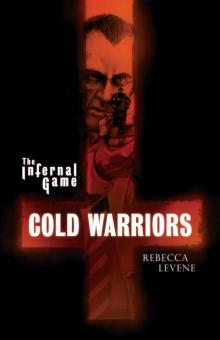 Cold Warriors
Cold Warriors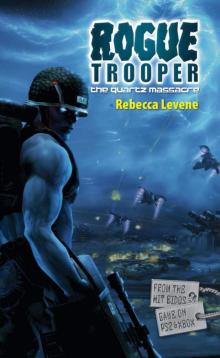 The Quartz Massacre
The Quartz Massacre The Hunter's Kind: Book II of The Hollow Gods
The Hunter's Kind: Book II of The Hollow Gods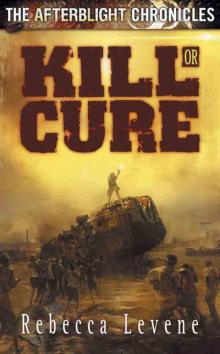 Kill or Cure
Kill or Cure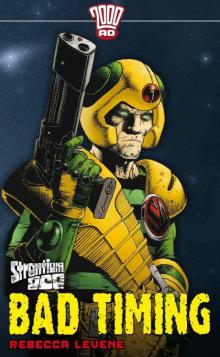 Bad Timing
Bad Timing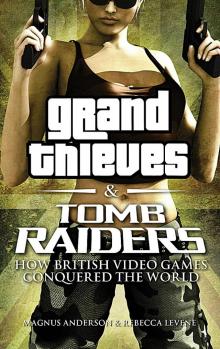 Grand Thieves & Tomb Raiders
Grand Thieves & Tomb Raiders Ghost Dance
Ghost Dance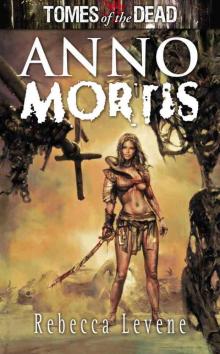 Anno Mortis
Anno Mortis